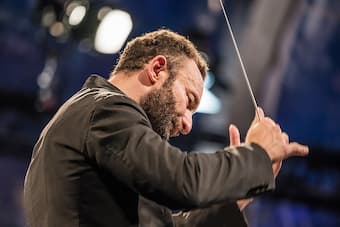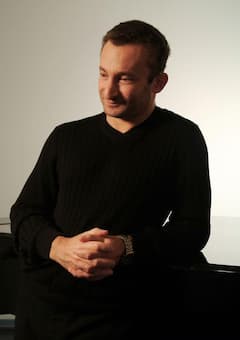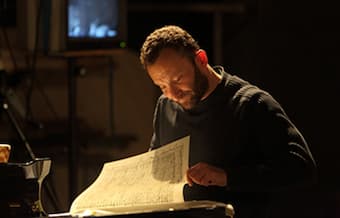
Kirill Petrenko
Kirill Petrenko, currently chief conductor of the Berlin Philharmonic, was born on 11 February in Omsk, a city in Siberia “that made its living from the arms industry and petrochemicals.” Petrenko recalls that it was a closed city for foreigners, and that the chemicals weren’t particularly healthy… It was also freezing cold. School was sometimes canceled because of this: The little ones were allowed to stay at home from minus 34 degrees, the big ones had to freeze to minus 38 degrees.” Kirill came from a musically active family. His father originally hailed from the Ukraine and was an accomplished violinist, while his mother was a musicologist with a specialization in dramaturgy. From his earliest memory, Kirill knew that he wanted to be a musician. He took piano lessons and made his public debut as a pianist at the age of 11. His family immigrated to Austria when Kirill was 18, and his father became concertmaster in the Symphony Orchestra Vorarlberg. Petrenko continued his studies at the local Conservatory, and graduated with honours in piano performance.
Mozart: Symphony No. 35 “Haffner” (Berlin Philharmonic and Kirill Petrenko)
 Intuitively, Kirill Petrenko had always known that he was meant to be a conductor. As such, he continued his musical studies at the University of Music and Performing Arts in Vienna. Upon graduation, he was immediately hired as conductor of the Vienna Volksoper, and in 1999 he got the call to serve as general music director at the famed Meiningen Theatre and subsequently also at the State Opera in Munich. He conducted his first guest concert with the Berlin Philharmonic in 2006, essentially following in the footsteps of Hans von Bülow, the founder of the Berlin Philharmonic Orchestra. “I’m privileged,” Petrenko writes, “because I’m following Bülow on my way. He was first in Munich, then in Meiningen, then in Berlin; my order is a bit different, but I feel very connected to his tradition through my work with the Meininger Hofkapelle and at the State Opera in Munich. I have studied scores with his entries everywhere: Brahms in Meiningen, Wagner in Munich, and I study his Beethoven interpretations very intensively.”
Intuitively, Kirill Petrenko had always known that he was meant to be a conductor. As such, he continued his musical studies at the University of Music and Performing Arts in Vienna. Upon graduation, he was immediately hired as conductor of the Vienna Volksoper, and in 1999 he got the call to serve as general music director at the famed Meiningen Theatre and subsequently also at the State Opera in Munich. He conducted his first guest concert with the Berlin Philharmonic in 2006, essentially following in the footsteps of Hans von Bülow, the founder of the Berlin Philharmonic Orchestra. “I’m privileged,” Petrenko writes, “because I’m following Bülow on my way. He was first in Munich, then in Meiningen, then in Berlin; my order is a bit different, but I feel very connected to his tradition through my work with the Meininger Hofkapelle and at the State Opera in Munich. I have studied scores with his entries everywhere: Brahms in Meiningen, Wagner in Munich, and I study his Beethoven interpretations very intensively.”
Anna Thorvaldsdottir: Catamorphosis (Berlin Philharmonic and Kirill Petrenko)
 Petrenko’s guest concert with the Berlin Philharmonic in 2006 included works by Bartók and Rachmaninoff. Sufficiently impressed with the orchestra, Petrenko stated at that time “What is special about the Berliner Philharmoniker is the ability and courage of each individual musician, whether solo wind player or section player, to radiate great freedom while making music. A freedom that always keeps an eye on the whole structure, a controlled risk in which the great order does not falter and which nevertheless allows complete unleashing at the moment of the performance.” It came as a surprise to a good many people when Petrenko was chosen as the chief conductor of the Berlin Philharmonic, replacing Simon Rattle in 2018. An orchestra musician relates, “In Europe, Kirill Petrenko is sort of a well-kept secret. Everything he does really turns to gold. He’s so respected in the profession, but he’s someone that doesn’t do many interviews. He hasn’t got a high media profile. So, yes, I expect that many people found that a very unusual choice, those who hadn’t heard of him before, but I assure you, you will be hearing a lot about him.”
Petrenko’s guest concert with the Berlin Philharmonic in 2006 included works by Bartók and Rachmaninoff. Sufficiently impressed with the orchestra, Petrenko stated at that time “What is special about the Berliner Philharmoniker is the ability and courage of each individual musician, whether solo wind player or section player, to radiate great freedom while making music. A freedom that always keeps an eye on the whole structure, a controlled risk in which the great order does not falter and which nevertheless allows complete unleashing at the moment of the performance.” It came as a surprise to a good many people when Petrenko was chosen as the chief conductor of the Berlin Philharmonic, replacing Simon Rattle in 2018. An orchestra musician relates, “In Europe, Kirill Petrenko is sort of a well-kept secret. Everything he does really turns to gold. He’s so respected in the profession, but he’s someone that doesn’t do many interviews. He hasn’t got a high media profile. So, yes, I expect that many people found that a very unusual choice, those who hadn’t heard of him before, but I assure you, you will be hearing a lot about him.”
Beethoven: Symphony No. 9
 In his first season as chief conductor, Kirill Petrenko paid special attention to Beethoven. The season opening concert feature Beethoven’s Ninth Symphony, first played at the Berlin Philharmonic and subsequently in front of 35,000 spectators in front of the Brandenburg Gate. Since then, he has presented a full cycle of Mahler symphonies, works from the German-Austrian musical tradition, Russian Classics, and works from the 20th and 21st centuries, including compositions by Ives, Suk, Weill, Xenakis, Norman and Anna Throvaldsdottir. Petrenko brings great passion and forward thinking to the orchestra, and his interaction with orchestra players has been likened to dating. “It is a bit like dating,” a player explains, “as you sense right at the beginning if this is going to work. It’s a great feeling when that happens. It doesn’t always happen in music like that, but with Petrenko the rehearsal worked really well and the concerts were electrifying.” Petrenko is not a showman nor pop star, and has been described as “very shy, very humble, but incredibly genuine.” He is not particularly interested whether his conducting gestures will look good on television, but primarily concerned with the musical outcome. He considers himself a storyteller with sound, “because the emergence of a feeling is always linked to a story. We can’t detach ourselves from the environment and deal with sounds purely musically. There are historical and social connections that go into the music that you have to bring out again when you interpret it.”
In his first season as chief conductor, Kirill Petrenko paid special attention to Beethoven. The season opening concert feature Beethoven’s Ninth Symphony, first played at the Berlin Philharmonic and subsequently in front of 35,000 spectators in front of the Brandenburg Gate. Since then, he has presented a full cycle of Mahler symphonies, works from the German-Austrian musical tradition, Russian Classics, and works from the 20th and 21st centuries, including compositions by Ives, Suk, Weill, Xenakis, Norman and Anna Throvaldsdottir. Petrenko brings great passion and forward thinking to the orchestra, and his interaction with orchestra players has been likened to dating. “It is a bit like dating,” a player explains, “as you sense right at the beginning if this is going to work. It’s a great feeling when that happens. It doesn’t always happen in music like that, but with Petrenko the rehearsal worked really well and the concerts were electrifying.” Petrenko is not a showman nor pop star, and has been described as “very shy, very humble, but incredibly genuine.” He is not particularly interested whether his conducting gestures will look good on television, but primarily concerned with the musical outcome. He considers himself a storyteller with sound, “because the emergence of a feeling is always linked to a story. We can’t detach ourselves from the environment and deal with sounds purely musically. There are historical and social connections that go into the music that you have to bring out again when you interpret it.”
For more of the best in classical music, sign up to our E-Newsletter
Scriabin: Le Poème de l’extase (Berlin Philharmonic and Kirill Petrenko)
